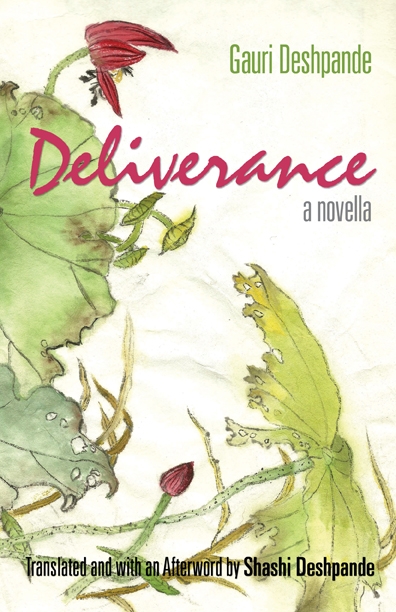http://www.hindu.com/lr/2011/03/06/stories/2011030650100300.htm
Deliverance (Nirgaathi), Gauri Deshpande, translated by Shashi Deshpande, Women Unlimited, p.134, Rs. 225.
Does a human-being indeed have the power to lead one’s life just the way he/she wants to? Or is there a heavy price to pay for being thus fearless? Is a woman any less feminine if she mothers her children differently from the mollycoddling stereotype that we’re accustomed to? Or does she eventually pay a price for being so, by carrying a mountain of guilt on her shoulders when she and her child reach a stage of having little or no dialogue due to the inevitable disagreements that crop up amidst them?!
These and many such thought-provoking aspects form the base of (late) Gauri Deshpande’s Deliverance – a novella originally written in Marathi as Nirgaathi and recently translated into English as Deliverance by Shashi Deshpande.
The first thing that leaves a reader overwhelmed when he/she starts skimming through Deliverance is the sheer woman-power that oozes through the effortlessly powerful writing that coursed through Gauri’s pen, especially in an era more than two decades down the line!
Originally written in 1987, the contents of the book tend to startle (if not shock) the reader more than once, for the sheer fearless transparency with which Gauri has written about the protagonist’s elder daughter Mimi expressing physical attraction to her step-father Yaju or the protagonist (the narrator) candidly expressing her failure at fathoming her second daughter Shami who she incidentally had at a much advanced stage in life and that too with her second husband!
These aspects may not leave you agape in the present-day scenario; but two decades earlier, they were certainly potent enough to be labelled “bold” or “radical”!
While the book is a novel for all practical purposes, Gauri does hint at the story having a semi-autobiographical tangent; which in turn makes the rationale behind the radical content more lucid. Born into a family of reformers (she is the grand-daughter of Maharshi Karve) with a legendary writer like Irawati Karve as her mother, Gauri grew up in a uniquely progressive and intellectual set-up; albeit juxtaposed with some conventional beliefs such as “girls must be married by a certain age” and so on.
This unusual upbringing instilled in Gauri a confidence to chart her own course fearlessly, irrespective of whether it would need her to rebel against established societal norms for the same. The joys, challenges and sacrifices of leading such an unfettered life are effectively expressed through the cheer as well as anguish of the protagonist who, for instance, revels in the sweet memory of an unexpected lover on one hand; and feels saddened by the conflicted relationship that she shares with her second husband and so on.
More facts
The novel also makes for an interesting read due to the portrayal of the close-knit relationship between half-sisters Mimi and Shami (which adds to the protagonist’s consternation about her own bitter-sweet relationship with Shami). The inclusion of characters as distinct as the Japanese Yoshi and Hisayo on one hand and Janu Bhaiyya and Tai on the other, make for a riveting multi-ethnic hotchpotch of the thoughts and times of the lives running tangential to that of the protagonist’s.
While the content of the novel is indeed unusual and makes for an interesting read especially if turbulent relationships amid closely-knitted family members and startling denouements are your cup of tea; on the flip side, the disconnected narrative tends to confuse the reader at more points than one.
Chronology absent
Written from the narrator’s perspective in a monologue-dialogue-letters format; the story swings between past, present and future, with chronology becoming conspicuous by its absence at many points.
Thus it becomes a task of sorts for readers to grasp connectivity between one instance and another; proving to be a bit of a dampener for the sheer tediousness involved.
If not read at a stretch, it becomes especially difficult to hark back to where was an ‘X’ character standing when you last put the book down – thus also making it a laborious exercise.
Of course, one cannot blame the author for that; it’s just a case of the translated version coming a bit too late in the day. But still, Shashi Deshpande’s effective grasp of what Gauri had intended to convey and her adroitness at expressing the same in a very simple yet thought-provoking manner, make Deliverance a must-read at least once, if not several times over.

